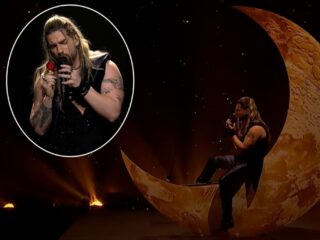Love him or hate him, you always remember Milan Stankovic. Since winning the right to represent Serbia at Eurovision on March 13, the 22-year old has inspired shock and awe in equal measure. Fans praise his energy and have dubbed him the next Placido Domingo. Critics deem his voice feeble and compare him to a flat-chested lesbian. In the same way, his entry “Ovo Je Balkan” (This is Balkan), inspires some fans to kick up their heels and dance. Others say the sonorous heeeey it opens with triggers indigestion.
In the song, Milan begs his girlfriend Ljubica to get physical:
Heeeey, Ljubica, Ljubica. You’re making my mouth water. Heeeey, squeeze me, kiss me, Ljubica, press me against your chest.
Given that Ljubica is wearing a traditional folk dress, I can understand why her loins don’t exactly emit fire. But he protests nonetheless and has the nerve to call her a “chump” — perhaps he’s making up for his own masculine shortcomings? Realizing that guilt may inhibit her, Milan connects sex with culture: he says it’s in the Balkan D.N.A. to get down on it.
You’re kissing me like a chump. You have no shame. Belgrade, Belgrade, I’m cheeky. Not once, not twice, three times, no? Belgrade, Belgrade, three times, it’s our way. Balkan, Balkan, Balkan. This is Balkan. Come on! Hop, hop, hop, this is Balkan. Come on! Hop, hop hop….Your breasts, Ljubica, a deadly weapon…
In a field of pop ballads and Eurodance tracks, the song’s regional sound stands out. That’s down to Goran Bregovic, perhaps the Balkans’ most celebrated composer, who wrote the music and lyrics. He’s also the man who first imbued Serbian music with elements of Gypsy folk, rebranding what is thought of as “traditional.” You may recognize his style: samples of his tracks color Borat: Cultural Learnings of America for Make Benefit Glorious Nation of Kazakhstan.
Critics say Milan is unworthy of working with such greatness. He shot to fame in 2007 while a contestant on the Serbian talent show Zvezdama grande. His first album Solo sold more than 50,000 copies and schoolchildren across the country emulated his hairstyle. He’s seen as somewhat shallow, and he doesn’t do himself any favors. In a recent interview with eurovision.tv, he debated how he should style his hair in Oslo: “Should I look like I did at the finals in Serbia? Or change it a little bit? I’m still thinking about it. It’s a big thing for me.” And there are plenty of shirtless pics of him floating around the Internet.
He might want to concentrate on styling his act, first. It’s charming how his back-up dancers transform from peasant-chic to ghetto fabulous, and how their moves jump from rural folk dance to urban krump. But Milan’s transformation is less convincing. His white jeans and white cut-off top doesn’t connote modern, he can’t keep up with the dancers and their antics generally upstage his. Maybe Ljubica isn’t the chump in this after all.
Prediction:
Eurovision’s founders envisioned the contest as a musical Olympics: a continent-wide competition where rivals could look past their differences and celebrate their common humanity. Over the years, though, nationalism has made it more akin to World War II. Regional pride usually means that former Soviet states give their votes to Mother Russia, that tiny Andorra divides its share between France and Spain, etc.
Serbia’s entry cleverly plays on Balkan identity. That could attract votes from Albania, Bosnia and Herzegovina, Bulgaria, Croatia, Greece, Kosovo, Macedonia and Montenegro (and, depending on how you demarcate the region, maybe Moldova, Romania, Slovenia and Turkey). Of course, regional identity can’t save a total dud. Last year, Romania’s entry “The Balkan Girls” finished a disappointing 19th.
Milan competes in the first semi-final. Bookies have him listed in eighth place, well behind the homoerotic front-runners from Greece, and just behind the grammatically nonsensical entry from Moldova. Only countries competing in a given semi-final are allowed to vote in that semi-final. If the Balkan theme does curry favor with Serbia’s neighbors, that means they can count on votes from Albania, Bosnia and Herzegovina, Macedonia, and Moldova — all of whom compete in their semi-final. I’m confident that Serbia will advance to the finals, even if by the skin of its teeth.
In the final, Serbia faces an uphill battle. The most generous bookies have Milan down at 40:1 to win, though most bookies have him listed at 80:1—or worse. That places him somewhere between 20th and 25th. And while Milan will win many fans during Eurovision, the song will prove too ethnic and too original for the mainstream jury of recording professionals.








